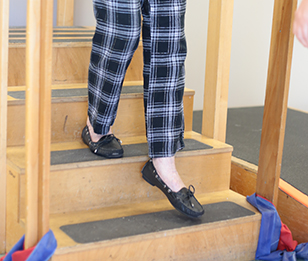
Movement disorder patients rediscover daily life with occupational therapy
Living with a movement disorder can present daily challenges, but occupational therapy offers patients the tools and strategies to regain independence and improve their quality of life. At the Movement Disorders Program, our specialized occupational therapists focus on helping individuals overcome cognitive, perceptual, balance and neuromuscular difficulties that affect essential daily activities. Whether it’s bathing, grooming, eating or other routine tasks, we tailor therapy to support each patient's unique needs. Through expert assessment, we recommend adaptive aids and equipment that promote functional independence, making everyday living more manageable and fulfilling.
How occupational therapy benefits movement disorder patients
Occupational therapy plays a vital role in helping individuals with Parkinson’s disease and other movement disorders regain confidence and mobility. Our approach is centered on improving physical function while enhancing each patient's ability to perform everyday tasks with greater ease. Therapy sessions are designed to strengthen muscles, refine coordination and develop techniques that allow patients to maintain an active and independent lifestyle. With the right strategies and support, patients can adapt, adjust and thrive despite the challenges posed by movement disorders.
Occupational therapy provides the following benefits:
- Restoring independence in daily activities such as dressing and hygiene care
- Enhancing range of motion and strength to improve mobility and overall function
- Refining fine motor coordination skills, including tasks like handwriting and utensil use
- Boosting task efficiency through improved speed and motor planning
- Training patients on adaptive equipment for work and energy conservation
- Educating and supporting care partners in self-help techniques and adaptive strategies for better long-term outcomes
By focusing on these key areas, our therapists empower patients to take control of their daily routines while also providing essential guidance for family members and caregivers.

